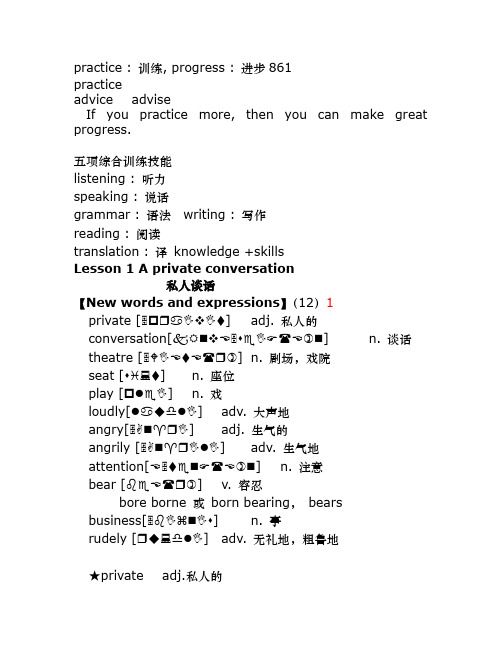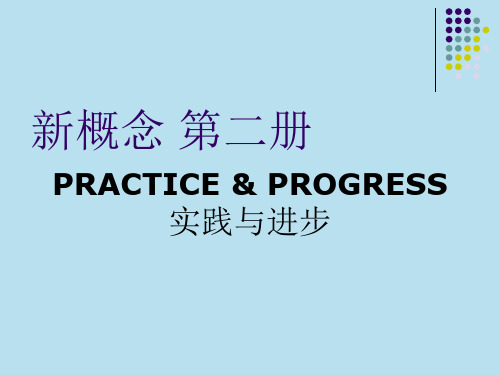新概念第二册自学导读 Lessons1
新概念第二册第一课讲解

lesson1---- A private conversation课文内容:Last week I went to the theatre(see a film,go to the cinema).I had a very good seat. The play was very interesting.I did not enjoy it.A young man and a young woman were sitting behind me.They were talking loudly.I got very angry. I could not hear the actors.I turned round. I looked at the man and the woman angrily.They did not pay any attention.In the end, I could not bear it.I turned round again. ‘I can't hear a word!’I said angrily.‘It's none of your business,’the young man said rudely.‘This is a private conversation!’NEW WORDS AND EXPRESSIONS生词和短语★private adj。
私人的 n。
士兵,列兵(individual, personal)in private 秘密地:非公开地;秘密地或在私下地privacy:隐私 it's a privacy. adj。
privateer (战时特准攻击敌方商船的)武装民船,私掠船拯救大兵瑞恩,private soldier:大兵private citizen普通公民 , private life:私生活it's my private letter/house;private school(私立学校)public:公众的,公开的public school公立学校;public letter公开信;public place公共场所★conversation n。
新概念英语第二册Lesson1

B
6.The two countries are holding C on different issues. A:a conversation B:a dialogue C:talks D:chats 7.Try to pay attention to your spelling. A A:some B:many C:any D:a few 8.What D you at 8 last night? A:were;did B:did;do C:did;doing D:were;doing
loudly adv.大声的 副词变为形容词:___ 大声的 speak ____=speak in a ___voice =speak up
angry
adj.生气的 adv 生气地 ___ be angry with sb.对某人生气
cross=angry I was angry. He was cross.
the theatre.
ቤተ መጻሕፍቲ ባይዱ
7. The young man and the young woman paid d attention to the writer. a. none 代词 b. any 否定/疑问句中 did not pay any 而不是pay not any c. not any did not pay any attention=pay no attention d. no 8. He had a good seat. He was sitting in a good a. chair 椅子 b. place 位置 c. armchair 扶手椅 d. class 班级 b .
conversation n.谈话 划分音节记单词 1. talk 名词或动词 动词搭配短语? 2. conversation 名词 (比talk稍正式)、 We’re having a conversation. 3.dialogue 名词,剧中的对白;也可指正式国家 间会谈: China and Korea are having a dialogue. 4.chat 名词或动词 闲聊 chat on QQ 5. gossip 嚼舌头,说长道短 have a + talk/chat/dialogue/conversation/gossip 名词变动词
新概念英语第二册 第一课(共22张PPT)

12. It’s none of your business. 关你屁事;这不关你的事。
class.上课期间你要专心听老师讲课。 15. ___I_n__th__e__e_n_d____they reached a place of safety.
他们终于到达了一个安全的地方。
16. Peter and Tom made up __in___th__e__e_n_d____.
彼特和汤姆最后和解了。 17. The shelf, too weak to ___b__e_a_r___all the books,
14. private ['praɪvət] adj. 私人的;个人的;私下的;私有的
The president is paying a private visit to Europe. 总统正在欧洲进行私人访问。 We each have our private views about it. 我们每个人对这件事都有自己的看法。
关你屁事;这不关你的事。 13. __r_u_d__e_l_y_ adv. 无礼地;粗暴地 14. __p__ri_v_a_t_e__ly___ adj. 私人的;个人的;
私下的;私有的 15. __c_o__n_v_e_r_s_a__ti_o_n_ n. 谈话;会话
Step 2 在语境中加深对词汇短语的理解与记忆,掌握其具体用法。 1. theatre [ˈθiːətər] n. 电影院,戏院;戏剧
II-01新概念英语第二册,第一课课文讲解,自学导读,练习详解

practice : 训练, progress : 进步861practiceadvice adviseIf you practice more, then you can make great progress.五项综合训练技能listening : 听力speaking : 说话grammar : 语法writing : 写作reading : 阅读translation : 译knowledge +skillsLesson 1 A private conversation私人谈话【New words and expressions】(12)1private [ ☐❒♋✋✋♦] adj. 私人的conversation[ ⏹☜♦♏✋☞☎☜✆⏹] n. 谈话theatre [ ✋☜♦☜☎❒✆] n. 剧场,戏院seat [♦♓♦] n. 座位play [☐●♏✋] n. 戏loudly[●♋◆♎●✋] adv. 大声地angry[ ✌⏹♈❒✋] adj. 生气的angrily [ ✌⏹♈❒✋●✋] adv. 生气地attention[☜♦♏⏹☞☎☜✆⏹] n. 注意bear [♌♏☜☎❒✆] v. 容忍bore borne 或born bearing,bearsbusiness[ ♌✋⏹✋♦] n. 事rudely [❒◆♎●✋] adv. 无礼地,粗鲁地★private adj.私人的①adj. 私人的private life 私生活private school 私立学校It's my private letter. (如果妈妈想看你的信)It's my private house. (如果陌生人想进你的房子)②adj. 普通的private citizen 普通公民I‟m a private citizen. (citizen n. 公民)③ n.士兵;二等兵.美国陆军或海军陆战队的非士官军衔,低于一等兵private soldier 大兵《Private Ryan》(《拯救大兵瑞恩》)public adj. 公众的,公开的(private的反义词)public school 公立学校public letter 公开信public place 公共场所privacy n.隐私It‟s privacy. 这是我的隐私!(不愿让别人知道的) Private adj. 1. 个人的,私人的= personale.g. a private care.g. a private garden2. 私营的,私立的e.g. New Oriental School is a private school.反义词:public adj. 公开的,公立的e.g. a public letter; a public placein private 私下里,单独地对应:in public 公开地e.g. She wanted to talk to me in private rather than in public.[script]Rachel: Ross, could I talk to you in private?Ross: Sure, you want to go upstairs?★conversation n.谈话have a + talk/chat/dialogue/conversation/gossip 名词变动词conversation 一般用于正式文体中, 内容上往往不正式subject of conversation 话题They are having a conversation.talk 内容可正式可不正式, 也可以私人Let‟s have a talk.dialogue[ ♎♋♓☜●♈] 对话, 可以指正式国家与国家会谈China and Korea are having a dialogue.chat[♦☞✌♦]闲聊,就是北京人说的“侃”,说的是无关紧要的事。
(最新版)新概念第二册Lesson-1--A-private-conversation

business rudely attention
bear
Grammar
英语中共有三种句子结构:简单句、并列句和复合句。
英语中,只含有一个主谓结构并且句子各成分都只由单词 或短语构成的独立句子叫做简单句。 简单陈述句:叙述一件事情。 例如:I am a teacher. You are student. I go to school by bus in the morning.
熊
.
give sb. a bear hug
loud
adj.大声的
----
loudly
angrily rudely
adv.大声地
adv.生气地 adv.无礼地,粗鲁地
angry adj. 生气的 rude adj.粗鲁的
形容词变副词的规则: 1.一般情况下直接加“ly”,如quick---quickly, loud--loudly, glad—gladly, real-really, slow-slowly, careful-carefully 等。 2.以辅音字母加y结尾的变y为i,然后再加-ly,如happy---happily, easy-easily, busy-busily 3. 少数以 e 结尾的形容词,要去掉 e 再加 -ly 。例如: true-truly, terribleterribly,possible-possibly等。 但绝大多数以e结尾的形容词仍然直接 加-ly。例如:rude-rudely, polite-politely, wide-widely等。
She studies in a private school
Let's discuss this later in private
新概念英语第二册_lesson_1

business
[作n.] 事情 thing 泛指事情 matter 一般指麻烦的事情 What‟s the matter? business 私人事情 It„s none of my business. affair 事务、事件(较正式) international affairs, love affairs
privation n.丧失;缺乏 privacy n.隐私
[重要词组] in private/public 译:我可以私下同你谈谈吗? Can I speak to you in private? [同义词] personal 个人的 PS: Personal Statement 个人陈述 PA: Personal Assistant 个人助理
[语言点2] young adj., man n. 形容词 修饰名词作定语。请注意它的位置,一 般放在被修饰的名词之前,但如果是介 词短语、形容词短语或修饰名词的从句 则放在被修饰名词之后。
比如: a man in the room(介词短语) 在房间里的一个男人。 Is it a problem difficult to solve (形容词短语)? 这是个难解决的问题吗?
1. Last week I went to the theatre. [参考翻译] 上个星期,我去了戏院看戏。 [语言点1]时间状语+主语+谓语动词+地点 状语 固定短语:go to the theatre [语言点2] 在theatre,cinema,pictures等词 之前一定要加定冠词the。
② enjoy doing enjoy swimming 喜欢游泳, enjoy fishing喜爱钓鱼 ③ 一般不可说enjoy sb This morning I enjoyed my English teacher. 但enjoy oneself是个例外! 比如请客人吃菜时: Enjoy yourself!
新概念第二册Lesson1Aprivateconversation详细讲解

It's my business. (指私人的事,自己处理的事)
It's none of your business.不关你的事。
one’s business指某人(所关心的或份内)的事
It's none of your business./None of your business./It's my business.不关你的事。
Can the icebear my weight?
Who willbear the cost?谁来承担这笔费用?
②vt.忍受(一般与can/could连用于疑问句及否定句中)
She eats too fast. I can’t bear to watch/watching her.她吃得太快。我看着受不了。
private['praivit] a.私人的
①adj.私人的
private life私生活
private school私立学校
It's my private letter.(如果妈妈想看你的信)
It's my private house.(如果陌生人想进你的房子)
②adj.普通的
private citizen普通公民
pay no attention不用注意
pay close attention密切注意
pay special attention特别注意
In the end, I could not bear it.最后,我忍不住了,
I could not bear it:我不能忍受
bear:
①vt.承受,支撑,承担,负担
bear/stand/endure忍受的极限在加大
新概念英语第二册第一课 详细版

bear hug热情的拥抱
11. business ① n. 生意
business man 生意人
do business 做生意
go to some places on business因公出差
②n.某人自己的私人事情
6. He had a good seat. He was sitting in a good( ).
A. chair b. place c. armchair d. class 7. He was a young man. He wasn’t very ( ) A. old b. big c. tall. d. large 8. The writer looked at the man and the woman
looked at ( )angrily. A. them b. they c. their d. us 5. The young man and the young woman paid ( )
attention to the writer. A. none b. any c. not any d. no
the children, quietly 5.quietly, the door, he, opened 6. immediately, left, he
7. a tree, in the corner of the garden, he, planted
8. before lunch, the letter, in his office, quickly, he, read,
behind the times 落伍, 赶不上潮流 eg. I am sorry to say, my dear, your clothes are a bit behind the
- 1、下载文档前请自行甄别文档内容的完整性,平台不提供额外的编辑、内容补充、找答案等附加服务。
- 2、"仅部分预览"的文档,不可在线预览部分如存在完整性等问题,可反馈申请退款(可完整预览的文档不适用该条件!)。
- 3、如文档侵犯您的权益,请联系客服反馈,我们会尽快为您处理(人工客服工作时间:9:00-18:30)。
新概念第二册自学导读 Lessons1
课文详注 Further notes on the text
1.Last week I went to the theatre.上星期我去看戏。
(1)句首的“Last week”点明叙述的事情发生的时间是上星期。
所以整篇课文的时态基本上应是过去时(包括过去实行时),直接引
语部分的时态除外。
(2)动词go的原义是离开一个地方去另一个地方,与介词to连
用后,常加上主语所要去的目的地来代表主语的动作目的。
课文中go
to the theatre = go to the theatre to see a play,即去剧场看戏。
类似的还有go to the cinema = go to the cinema to see a
film(去电影院看电影)。
这种表达方式简明扼要。
请注意在以下的
短语中名词前通常不加冠词:
go to school上学
go to bed上床,睡觉
go to church上教堂,去做礼拜(cf.第1册第68课at school, at church;第1册第85课have been to school/church)
2.had a very good seat,座位很好。
seat一般指戏院、汽车等配置的固定座位,也能够抽象地表示
“座位”或“位子”的概念:
the front seat of a car汽车的前座
Take a seat, please.
请坐。
3.The play was very interesting. 戏很有意思。
interesting属于现在分词形式的形容词,意思是“使人感兴趣”。
它通常与非人称主语连用或修饰某个事物:
This is an interesting book/idea.
这是一本有趣的书/一个令人感兴趣的主意。
4.…were sitting behind me. They were talking loudly.……坐在我的身后,大声地说着话。
这两句的时态为过去实行时。
(cf.第7课语法)
5.I got very angry. 我非常生气。
get在这里有“逐渐变得”的含义,接近become,是个表示过程
的动词,表示状态的变化。
而I was very angry则仅表示当时的状态
是生气,并不暗示过程。
6.in the end, 最后,终于。
表示一段较长的时间之后或某种努力之后:
She tried hard to finish her homework by herself. In the end, she had to ask her brother for help.
她试图自已完成家庭作业,但最后她不得不请她兄弟帮忙。
7.none of your business, 不关你的事。
(1) sb. 's business指某人(所关心的或份内)的事:
It is my business to look after your health.
我必须照顾你的身体健康。
This is none of his business.
这根本不关他的事。
(2)表示否定的代词none意义上相当于not any或no one,但
语气较强:
She kept none of his letters.
他的信件她一封也没有保留。
None of my friends left early.
我的朋友没有一个早离开的。
none of这个短语有时能够表达一种断然、甚至粗暴的口气,
尤其是在祈使句中:
None of your silly remarks!
别说傻话了!8.a private conversation,私人间的谈话。
在西方文化中人们对private(私人的,个人的)这个概念很看重。
这个词的名词形式privacy有“隐私(权)”的意思。
所以课文中的
小伙子会振振有词地说“This is a private conversation!”不过他
忘了他是在一个public place(公众场合),而且他们的说话声太大,已经影响了别人。
语法 Grammar in use
简单陈述句的语序(Word order in simple statements)
主语一般为名词、代词或名词短语,通常位于动词之前。
动词必
须与主语“一致”,所以主语决定动词的单复数形式(如I am, you are, he has)。
宾语一般为名词、代词或名词短语。
在主动句中,宾
语一般位于动词之后。
一个句子不总需要有宾语。
状语的位置比较灵活。
当一个句子里有一种以上的副词时,地点副词的一般位置是在方
式副词之后、时间副词之前,如上面的最后一个例句。
时间状语能够
在句尾,也能够在句首:。
